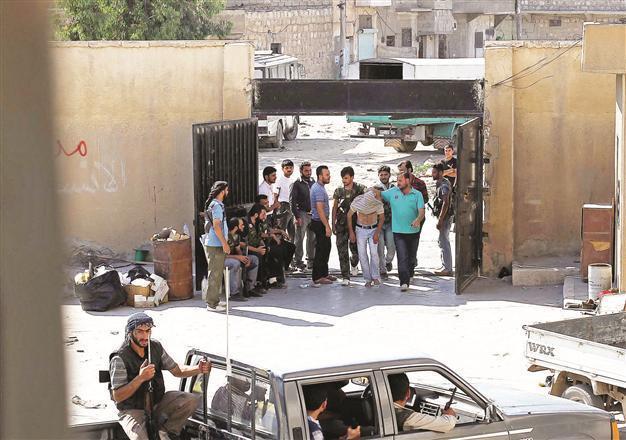Post-Assad scenarios on all tables, minister says
ANKARA - Hürriyet Daily News

Members of armed Free Syrian Army bring alledge Syrian regime militias to their compound in Aleppo, near Turkey, where rebels and regime forces clash. AA photo
Turkey has said that not a single international or national actor believes Syrian President Bashar al-Assad will keep his position. “Everybody has started making plans for the [post-al-Assad] period,” Foreign Minister Ahmet Davutoğlu said July 27 in a televised interview.Davutoğlu’s remarks came after his meeting with senior defector Manaf Tlass, who paid a quick visit to Turkey late on July 26 as part of efforts to obtain a role in the post-Assad era. Tlass had dinner with Davutoğlu, Intelligence Chief Hakan Fidan and senior Foreign Ministry officials. Turkish officials abstained from declaring clear support for Tlass, but in principle Turkey believes in the advantage of a figure who has had experience in Syria for many years, rather than dissidents who have been exiled for a long period of time.
Share experience with Tlass
“We shared our experiences [on Syria]. He broke from off the system psychologically even before us. He says the [Syrian administration] was making the wrong decisions,” Davutoğlu said. He also said efforts to create a perception that a “northern Syria” was being established were “psychological operations.”
Turkey has mobilized as some circles try to establish a “fear that a region where Kurds reside was being established [in Syria],” Davutoğlu said, adding that there were a number of opportunistic groups such as the Democratic Union of Kurdistan (PYD) waiting to take advantage of such a situation. He said relatively few Kurds actually lived in the districts of Ayn al-Arab and Afrin, where it has been claimed that PKK flags were flown.
Sitting on the fence since the uprising in Syria started, the PYD is now showing opportunism after it realized that the regime would soon collapse, Davutoğlu said. Turkey does not consider the Syrian Kurds a threat and does not oppose a certain ethnic group, but it is against “terrorist groups like the Kurdistan Workers’ Party [PKK] or al-Qaeda” establishing a presence in Syria near the Turkish border, the foreign minister said.
“We don’t consider any group a threat. Above all, Kurdish groups, whether in Syria, Iraq or in Turkey, they are as close as two coats of paint ... We don’t perceive them as a reason for tension,” Davutoğlu said, attempting to correct the sense that Ankara was alarmed about Kurdish unification along its border with Syria and Iraq. However, he said Turkey firmly favored Syrian unity, recalling how the French mandate created a division of Syria into six zones in the early 20th century and how this division’s negative impacts. Turkey was against the division of Syria on the basis of ethnic and sectarian lines, the minister said, citing the situation in Lebanon and Iraq.
‘Iran should not be opposite newborn region’
Iran should not be in a position opposing the newly born region, Davutoğlu said, adding that he had also discussed the issue with Iran’s deputy chief nuclear negotiator Ali Bagheri during a recent meeting. “Iran has to enter a period of self accounting … Iran should not be located at the counterpole of this newborn region,” he said.
‘Israel’s step not enough’
ANKARA - Hürriyet Daily News
Foreign Minister Ahmet Davutoğlu yesterday reiterated the need for strict fulfillment of Turkey’s conditions for normalizing ties with one-time ally Israel.
Turkey and Israel fell out badly in 2010 after Israeli commandos stormed the Mavi Marmara humanitarian aid ship that was trying to break the naval blockade of the Palestinian-run Gaza Strip, killing nine Turkish activists. Turkey has since demanded a formal apology from Israel for normalization of ties, as well as compensation for the victims and the families of the dead, but Israel has so far only ever expressed “regret.”
A new process with Israel can start if Ankara’s conditions are met, Davutoğlu said yesterday in an interview with private television station Kanal 24.
The issue cannot be resolved through the sympathetic messages recently sent through the media, Davutoğlu said, referring to Israeli officials’ remarks reported by a delegation of Turkish journalists, including Hürriyet Daily News.
Israeli Prime Minister Benjamin Netanyahu told Hürriyet Daily News in a recent interview that Turkey and Israel “had to keep looking for ways to restart the relationship,” particularly now “for the stability of this region at this time.”
The state of affairs regarding Turkey’s bilateral relations with Syria cannot be associated with Israel, Davutoğlu also said. His words were an apparent reference to Netanyahu’s remarks and Israeli media reports saying that “Israel hopes the rebuilding of bilateral relations between the two democracies could prove to be a stabilizing force in the region,” particularly after the shooting down of a Turkish military aircraft by Syria last month.
















